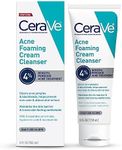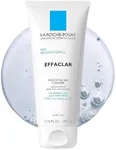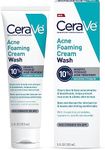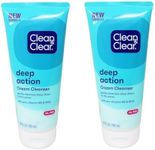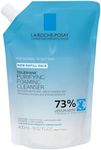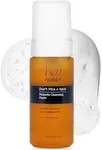Buying Guide for the Best Antibacterial Face Wash
Choosing the right antibacterial face wash can be a game-changer for your skincare routine. The right product can help you maintain clear, healthy skin by targeting bacteria that cause acne and other skin issues. When selecting an antibacterial face wash, it's important to consider several key specifications to ensure you pick the best fit for your skin type and concerns. Here are the key specs to look out for and how to navigate them.Active IngredientsActive ingredients are the components in the face wash that target bacteria and other skin issues. Common active ingredients include benzoyl peroxide, salicylic acid, and tea tree oil. Benzoyl peroxide is effective for treating acne by killing bacteria and reducing inflammation, making it suitable for those with moderate to severe acne. Salicylic acid helps to exfoliate the skin and unclog pores, which is great for those with mild acne or blackheads. Tea tree oil is a natural antibacterial agent that can be gentler on the skin, ideal for those with sensitive skin. Choose an active ingredient based on your skin's needs and how it reacts to different treatments.
Skin Type CompatibilityDifferent face washes are formulated for different skin types, such as oily, dry, combination, or sensitive skin. Oily skin types may benefit from a face wash with oil-absorbing ingredients like clay or charcoal. Dry skin types should look for hydrating ingredients like glycerin or hyaluronic acid to prevent over-drying. Combination skin types need a balanced formula that can address both oily and dry areas. Sensitive skin types should opt for gentle, fragrance-free formulas to avoid irritation. Knowing your skin type will help you choose a face wash that complements and addresses your specific skin concerns.
FormulationFace washes come in various formulations, including gels, foams, creams, and bars. Gel cleansers are lightweight and often suitable for oily and acne-prone skin. Foam cleansers can be effective for deep cleaning but may be drying for some skin types. Cream cleansers are typically more hydrating and suitable for dry or sensitive skin. Bar cleansers can be convenient but may contain harsher ingredients. Consider your skin type and personal preference when choosing the formulation that will work best for you.
pH LevelThe pH level of a face wash can affect your skin's natural barrier. A pH-balanced face wash (around 5.5) helps maintain the skin's natural acidity, which is important for keeping bacteria at bay and preventing irritation. Products with a high pH can strip the skin of its natural oils, leading to dryness and irritation, while those with a low pH can be too acidic. Look for a face wash that is pH-balanced to ensure it supports your skin's health.
Fragrance and AdditivesFragrances and additives in face washes can sometimes cause irritation, especially for those with sensitive skin. Fragrance-free and hypoallergenic products are generally safer choices for sensitive skin types. Additionally, avoid face washes with harsh chemicals or unnecessary additives that can strip the skin of its natural oils or cause allergic reactions. Always check the ingredient list and opt for products with minimal and gentle ingredients.
Brand ReputationThe reputation of the brand can give you an idea of the quality and effectiveness of the face wash. Established brands with positive reviews and a history of dermatologically tested products are often more reliable. Researching customer reviews and seeking recommendations from dermatologists or skincare professionals can help you make an informed decision. Trustworthy brands are more likely to provide products that are safe and effective for your skin.

